Dear Healthy Jew,
Last week we explored the meaning of life being a journey: the unfolding process of moving with effort from here to there. We noticed how hard it is to appreciate the voyage’s value in an era where cars and airplanes do most of travel’s work, and that the simple solution is to consciously choose to become Walkers.
The Age of Waze
However, our troubles don’t end with transportation’s motorization.
Over the past few decades, incredibly helpful navigation apps such as Waze and Google Maps have gradually stolen one of the journey’s last remaining expressions: the effort of being aware that I’m going from here to there. Today, not only our bodies check out when we travel. Our minds don’t even guide our vehicles along the route.
If the apps could really think and talk, they would say something like this:
Type in your destination and watch as the timer counts down to your arrival. Completely forget the journey; just turn right and left whenever we command you.
As far as travelling goes, we’ve been reduced to docile zombies, our eyes fixed only on the asphalt strip directly ahead. When we hit the road, we literally have no idea where we are right now, what’s that hill or building to the right of us, why are we’re turning left here. We’ve completely lost the way – not only the right way, if there ever was one, but any way.
Driving Journeys
Yet all is not lost. It’s possible to reclaim life’s journey - without needing to do anything unfeasible or unreasonable. Here’s my approach to genuine travel.
Mostly simply, I don’t drive by the call of the apps unless I don’t know the way or I need traffic updates. And I try staying mindful of where I am, which can be quite meaningful in the area of the world I call home.
Here are the ruins of Bet Shemesh that date all the way back to the First Temple Period and then some. There is the Valley of Elah, where David battled Goliath. And oh, here is yet another ritual bath or winepress from the Second Temple Period.
But I also don’t avoid driving when I need to, nor do I self-righteously renounce all those evil apps, because the reality of modern society is no less real than the reality that life is a journey. Like for many people, the distances I travel often (but not always!) preclude walking. And pulling over every mile to squint at a printed roadmap (if I can find one) is just plain nuts.
The heart of the solution, in my view, isn’t in not using apps. I prefer a positive strategy, to proactively navigate through God’s world. So I invest lots of time and effort in consciously traveling through Natural Israel: not by hopping from destination to destination with no idea how I got from one place to then next (or even where they are on the map), but through studying the country’s roads, paths, regions, and landmarks with the same seriousness I learn Talmud.
The journey begins with reading and watching about the local history, geography, plants, animals, and people. Later, while en route, I remain in the journey’s process by paying attention to where I am right now, taking notice of the sites and scenery. Sometimes I’ll even stop for a closer look.
The journey’s details have changed in the Age of Waze, but its principles remain the same.
Here’s a little nighttime drive with a friend on his jeep over the trails outside of Bet Shemesh. Although I used an app to help him navigate, I knew where I was going because I’d hiked there many times before - during the day.
Walking Journeys
Although mindful driving is a great beginning, I’ve found that it’s not quite enough. However much I study the path ahead, cars and airplanes remain quite limited teachers for the journeys of life. It’s impossible to be fully immersed in travel when my body isn’t moving at all. And it’s often not feasible and reasonable to pay attention and find meaning in the route, particularly when speeding down endless monotonous highways.
There’s no replacement for walking. To recover the journey of life, I must sometimes leave the car and walk, from here to there: to buy groceries, pick up the kids, pray, study, and work. Actually, the most healthful walking is so devoted to the here of the journey that it doesn’t even care where exactly is the there and when I’ll arrive. I’m just walking.
When I do need to get somewhere specific, which is, of course, usually the case, Google Maps can help without destroying the journey – if I use it similarly to an old-fashioned paper map: watching what’s on the left, understanding why I’m turning right. While walking, I have the time and capacity for this: I don’t need to keep my eyes glued to the blacktop.

Hiking Journeys
When confined to the city, sincere walking works wonders in every area of health and wellness. Yet this too isn’t always enough to fully experience life’s journey, to deeply appreciate the corridor that is this world. Therefore, I regularly travel - by walking, with effort - through this natural world, exactly how God formed it, hiking along a dirt trail with only a printed map clutched in my hand for guidance.
On the trail, nothing degrades or devalues the priceless journey and its messages.
I walk on the earth itself, meeting the world exactly how it is, with no need to “improve” it so that I may get there quicker.
The path twists and turns, rises and falls, following the landscape as it is, guiding me through life’s journey as it is. The terrain can be easy or tough, the view lovely or terrifying, because that’s how life is too.
Whatever the circumstances, my role is remains the same: continue trudging along, putting one foot before the next, fully here, right now. Simple, grounded, focused, and free.
When navigating with a map, every tiny change of the landscape - even a piles of old stones - teach me my place on the journey right now. In any given moment, I might be aware that I’m standing on this hill, behind me is that valley, to my right is sprawled that ancient village, and to the left stretch the mountains that lead to the next region of God’s world. I must know where I am; otherwise I’ll lose my way.
My destinations might include fascinating archeological sites with deep spiritual significance, or stunning views of shimmering lakes and awe-inspiring mountains. Whatever they are, they will have genuine value when I arrive because I genuinely journeyed to reach them. Sometimes I’ll walk with no destination at all, completely open to life’s journey, curious where it will take me.
Either way, it’s critical not to embark on hikes with any expectations of getting anywhere, feeling anything, or life-changing epiphanies. That would again be grasping at the destination, holding on to desired results. I’m walking just to walk, practicing the art of being inside the journey, present for each step of the process.
Although driving too has its dangers, there’s no minute-to-minute sense of jeopardy. The driver just relaxes in comfort - until the crash when everything crumbles instantly and traumatically. While hiking, on the other hand, I constantly feel the journey’s insecurity, whether because of people, animals, heat, cold, cliffs, or pits. Hiking teaches the inherent risk of genuine life: there’s no guarantee things will work out my way, because I’m on a voyage through a world far larger and more complex than I can ever understand and control. The Traveler’s Prayer takes on new meaning; every word is tangibly relatable.
Maps and Apps
And yes, sometimes I use hiking apps. They can be a rich source of information about where I am and what surrounds me. I particularly enjoy social apps where hikers before me tell what they discovered. If you read Hebrew, I highly recommend Amud Anan, an awesome app which provides updated information on Israel’s many thousands of landmarks and views.
Whenever it’s feasible and reasonable, I don’t “cheat” by letting the app fix my location and hijack the work of navigation. I find freedom by leaving my phone in my knapsack, taking it out only when I need it.
Looking for a good hiking map for Israel? Check out Shvil Net for excellent printed maps that cover most of the country (also only in Hebrew). (Next week I’ll share more specifically which regions to begin with). Besides giving detailed topography, roads, and trails, these maps also function as tour guides by marking and commenting on great places to visit on the way. They even highlight suggested routes for hiking and biking.
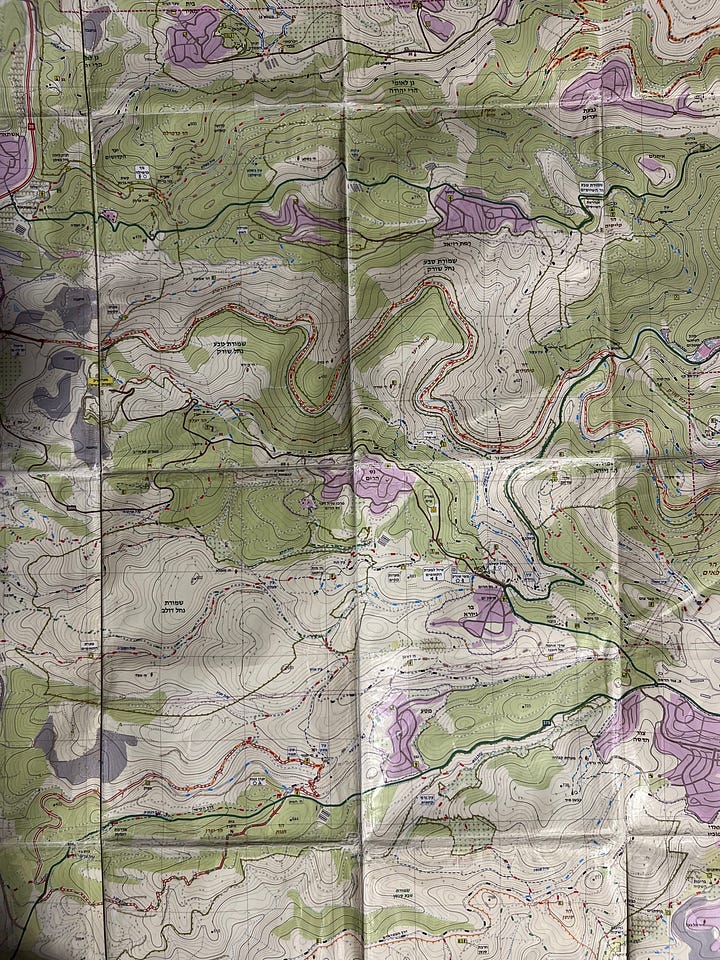

Navigating Through Life
As I’ve shared in the past, I’m a fellow who’s disposed to stress, which means I tend to live in all that needs to “be done” instead of where I am right now. Put another way, I have trouble discerning the journey from the destination, the result from the process. Wanting to “get there already,” I easily become overwhelmed when a hundred small tasks await me, finding no peace in the journey itself.
Perhaps more than anything else, navigating the world has taught me how to navigate life’s stresses.
If I set out to reach a long list of sites and sights, as I’m prone to do, I quickly end up lonely and miserable: I’m not on the journey, but desperately rushing to a dozen destinations at once. Thankfully, on the trail it’s easy and natural to recalibrate by letting go of my lists, transferring my attention to the trees, hills, and cows.
Similarly, when I’m feeling like I have way too much work to do, which last happened just this afternoon, I can remind myself that life is a journey with many thousands of steps, bumps, ascents and descents. All I need to do is take the very next step forward, as best as I can. There’s no rush to reach the destination when I’m happy and fulfilled in the world of the corridor.
One Suggestion: Embark on a voyage, noticing and caring about where you are. If possible, go on foot. The length doesn’t matter as much as the attention you bring to the journey.
One Question: Before you go, maybe drop a comment about what helps you stay present for the journey. Where have you been? What have you seen and learned?
Thank you for reading Healthy Jew.
Here are 2 great paths to continue the journey:
Also check out this intro and index to explore hundreds of posts about our 3 Healthy Jew topics: Wellness with Wisdom, Land of Life (Israel), and Sensible Spirituality.
Finally, always feel free to reach out here with any comments, questions, or complaints:
I look forward to hearing from you!
Be well,
Rabbi Shmuel Chaim Naiman
To learn more about living the journey of life in Israel, check out Healthy Jew’s Guide to Israel Journeys.

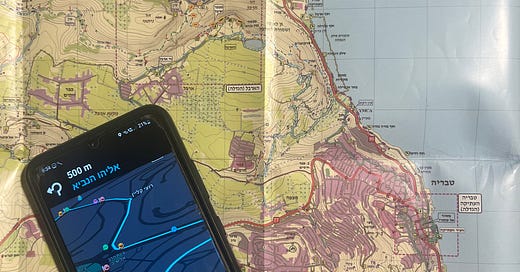




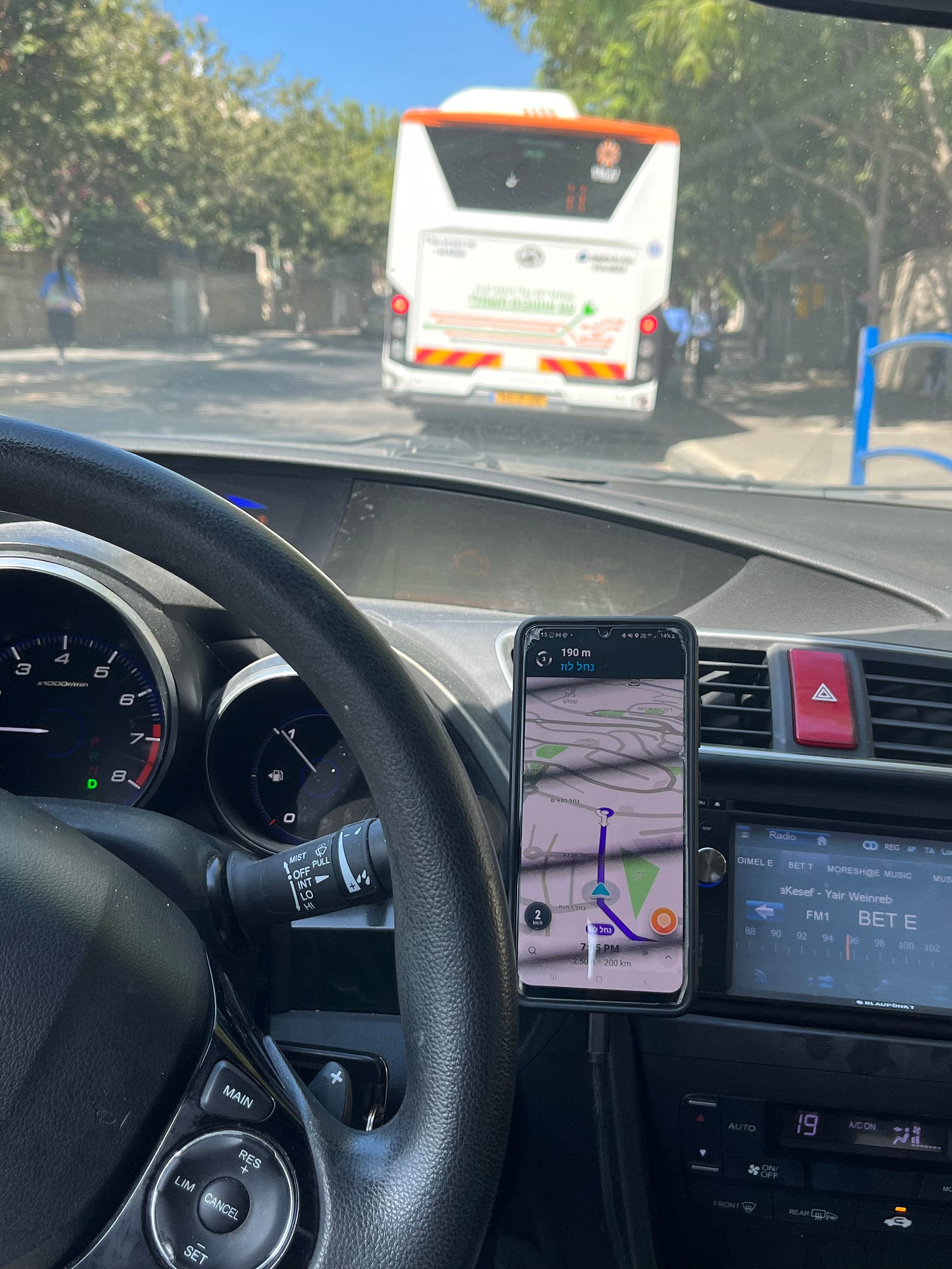
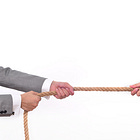
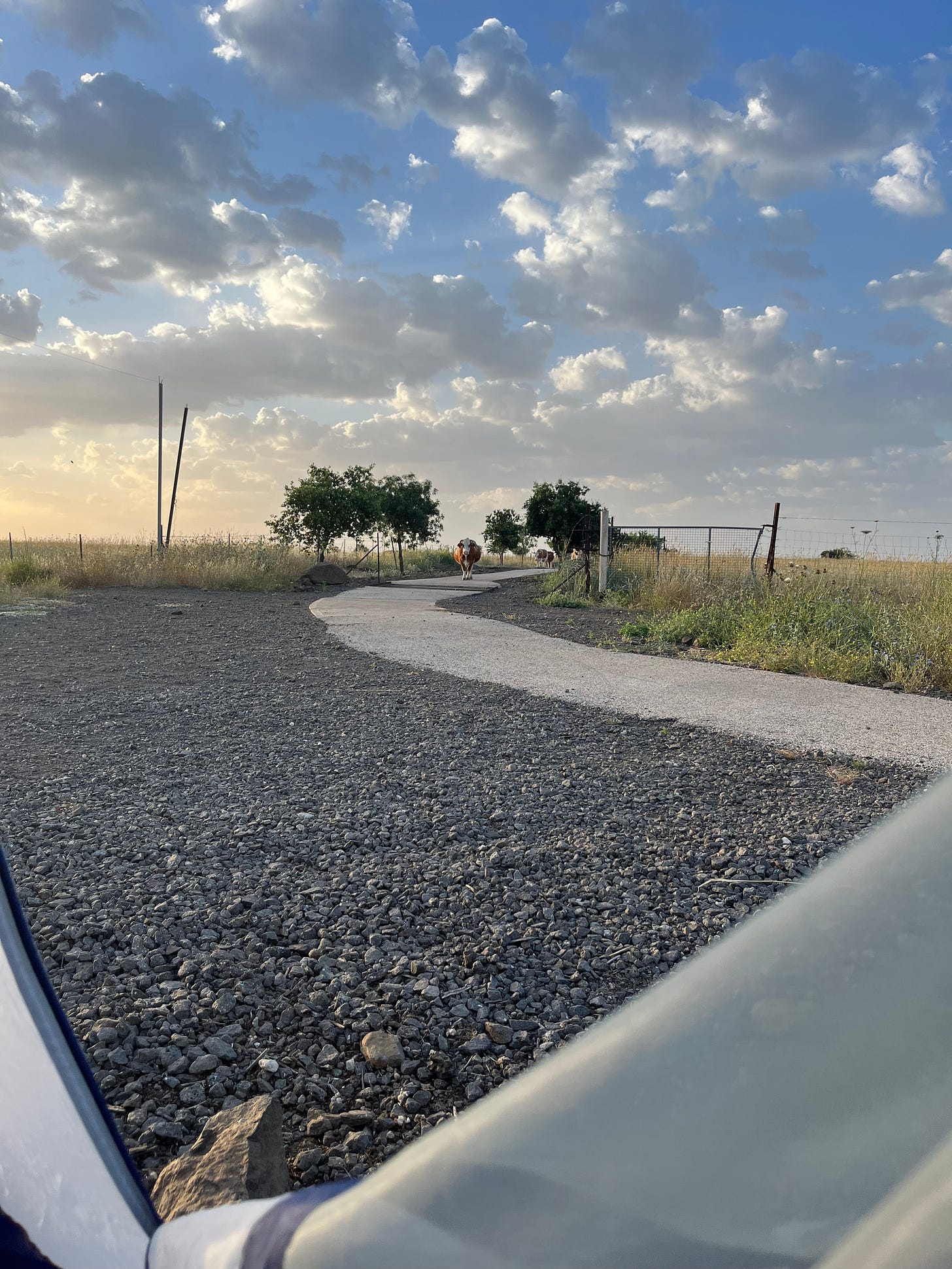



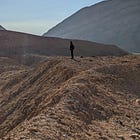
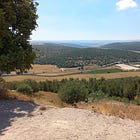
Check out Carmella Guiol's experiences shifting from apps to maps here: https://open.substack.com/pub/carmellaguiol/p/theres-an-app-for-that?r=29gozd&utm_campaign=comment-list-share-cta&utm_medium=web&comments=true&commentId=52662348